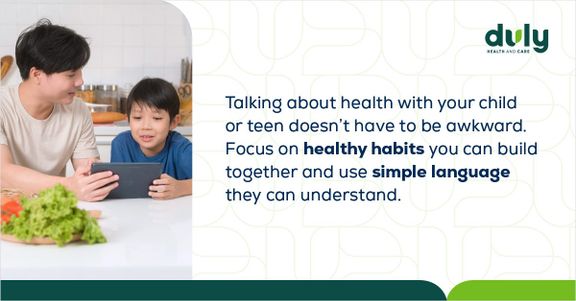Astronauts, their favorite Chicago sports team, the newest K‑pop star. These are all topics your child might love to talk about. But how do you talk about health with them in a way that gets them just as excited as talking about dinosaurs or the latest TikTok trend?
Talking about health can be tricky, but it doesn’t have to be — and the conversations you have about building healthy habits now can benefit your child throughout their entire life.
Here are 4 tips that can help you and your child have important conversations about what it means to be healthy.

1. Talk about what “healthy” actually means.
Talking to your child about forming healthy habits means talking about what “healthy” actually means. Health includes many parts of our life, and everyone may have their own definition of what it means to be healthy. You might say that something is healthy if it helps their body or brain grow, become stronger, or have more energy.
One of the most common places you might talk about healthy choices is when it comes to food. Try to avoid saying that some food is “good for you” and other food is “bad for you.” Instead, focus on how different foods can help you.
With a broad definition of what it means to be healthy, you can talk about how foods have vitamins, minerals, proteins, and carbs. You can talk about how your body needs a balance of all of these. Some foods (like eggs and bananas) give you lots of energy which can help you play outside or do sports. Other foods, (like yogurt or milk) help your bones grow strong. And some foods might seem healthy (like some granola bars or diet soda) but actually aren’t.
Your child’s primary care physician or pediatrician can play an important role in building healthy habits. Schedule an appointment today.
2. Remember, healthy habits aren’t just about food.
Being healthy isn’t only about the foods you eat. Talk to your child about the healthy habits they can build in all areas of their life:
- Sleep: Children between 6 and 12 years old should aim for 9 to 11 hours of sleep per night, and teens should aim for 8 to 10 hours of sleep per night.
- Movement: Children and teens between 6 and 17 years old should do at least 1 hour of physical activity daily that includes aerobic, muscle-strengthening, and bone-strengthening activities.
- Safety: Staying healthy also means staying safe. From sports safety to responding to peer pressure, there are many choices your child might have to make that you can talk about together.
3. Be honest about mental health.
In addition to talking about different aspects of physical health, it’s important to have conversations about mental health, too. Your child will face different challenges as they grow up — and they may be different from the challenges you experienced yourself.
Help your child understand that mental health is a normal part of life and that everyone gets stressed or sad from time to time. But when these feelings are frequent, they may need more mental health support. Just like their physical health needs attention, mental well-being is equally important. This might mean taking the time yourself to learn more about common mental health issues and their symptoms.
Let your child know you’re always here to listen — without judging. Ask them open-ended questions that can’t be answered with a “yes” or a “no” to encourage your child to share their thoughts and emotions.
When talking about what it means to be healthy, it’s also good to be a role model for positive behaviors — and not only talk about behaviors to avoid. For older children and teens, this might look like modeling self-care or starting a gratitude journal. For younger children, this might look like taking 10 deep breaths when they’re screaming in a grocery store.
Tip: Don’t leave social media out of your conversation about mental health. Teenagers often know how social media is making them feel, but might not know what to do about it. Talk together about its positive and negative impacts so you can both make informed choices about their social media usage.
4. Set health goals together.
From walking on the bike path with their friends to making their bed in the morning, all sorts of choices can make an impact on your child’s mental and physical health. When they can see the way that health is all around them, you can help them set goals about what habits they may want to focus on.
Maybe they want to eat more fruit in the lunch they pack for school. Or maybe they want to try out a new sport or other types of physical activity. They may even want to set boundaries for themselves around their social media usage.
You and your child can build healthy habits together, and it all starts with a conversation. Whatever goals they think are important, you can be there to support and encourage them along the way.
Health Topics:







